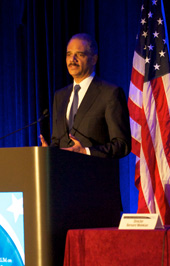Six Cities Present Plans to Reduce and Prevent Youth Violence
The following post appears courtesy of Laurie O. Robinson, Assistant Attorney General, Office of Justice Programs

Statistics tell us that crime rates are down. However, many communities still face challenges when it comes to preventing and reducing youth violence. That’s why President Obama launched the Forum on Youth Violence Prevention last year, and it’s why representatives from six cities were in Washington, D.C., on April 4-5, 2011. Officials from Boston; Chicago; Detroit; Memphis, Tenn.; Salinas, Calif.; and San Jose, Calif., have spent the past several months preparing plans detailing how they can work within their communities to address youth violence. They presented their plans at the Summit on Preventing Youth Violence hosted by the Department of Justice and other federal agencies, including the Departments of Education, Health and Human Services, Housing and Urban Development, Labor, and the White House Office of National Drug Control Policy.
Each city’s plan incorporates multi-disciplinary partnerships, balanced approaches, and data-driven strategies for real, sustainable progress. Ultimately, we expect that those plans will help these cities drive down crime and improve outcomes for kids, not just for a month or two but for years to come.
Attorney General Eric Holder, Special Advisor to the President Valerie Jarrett, and Surgeon General Regina Benjamin, M.D., all expressed their support for the Forum and the work of these six cities. We also know that this week’s meeting is just the beginning. This is a long-term project for our nation, but a necessary one. We aren’t looking for quick, cosmetic changes. We want long-lasting results. And we’re working together to get them.
As the Attorney General said:
Our children are counting on us. Our communities are counting on us. And we cannot – and will not – let them down.
This is not just our professional obligation – this is our moral calling.
Our nation will be defined, and its progress will be determined, by the support that we provide – and the doors that we open – for our young people. The priorities that we set now are what will allow America’s next generation of leaders to rise above the current threats and obstacles and seize tomorrow’s opportunities. This is our great test – and, in many ways, it is the single most consequential challenge we face in determining America’s future.
This week’s Summit was part of a national conversation about youth violence. We need to continue to add new voices to this effort. Our goals are ambitious—they require more hard work and more difficult conversations—but they are attainable. And they’re worth our time, energy, and investment. We can’t afford to stand for a violent epidemic that robs our youth of their childhood and perpetuates a cycle in which today’s victims become tomorrow’s criminals. We need to put our communities—and our kids—on better footing for the future.
For more information on the National Forum on Youth Violence Prevention, please see FindYouthInfo's new "Preventing Youth Violence" page.
